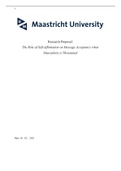1
Research Proposal:
The Role of Self-Affirmation on Message Acceptance when
Masculinity is Threatened
Date: 26 - 02 – 2021
,2
Abstract
Meat consumption is increasing rapidly as the world gets richer, even though an average
vegetarian diet is seen as healthier for humans and less damaging for the environment. One
reason for the increasing amount of meat consumption could be the meat-masculinity link.
Decreasing meat consumption is especially difficult in men, as meat is often associated with
toughness and masculinity (the so called ‘meat-masculinity link’). Governments and
institutions who wish to steer men to a more sustainable diet, ought to try a different strategy.
In this proposal, the role of self-affirmation in the acceptance of a message that addresses the
meat-masculinity link is investigated. The research question addressed in this proposal is:
What is the role of self-affirmation in the acceptance of a message that threatens one’s
masculinity by addressing the meat-masculinity link?
, 3
Introduction and Theoretical Background
Climate change is the most urgent and serious challenge humans are facing today.
Global temperatures and sea levels are rising, causing a shift in ocean currents and weather
patterns, which forms an immediate threat to humanity. Livestock and the meat industry have
been identified as leading factors behind climate change (Steinfeld et al., 2006). Meat
consumption has increased significantly over the last few decades, due to a growth in
population and global income (Gerber et al., 2013). Reducing meat consumption is therefore
seen as an important way of trying to live more sustainable (Steinfeld et al., 2006). The
increasing demand for meat and the growing meat production has its consequences on the
environment. Livestock have a huge impact on for example, the world’s water reserve, and
biodiversity. 26% of the ice-free terrestrial surface of the earth is used for grazing livestock.
Another 33% of the total arable land is dedicated to grow crops that is used to feed livestock
which contributes to deforestation. Moreover, animal agriculture is responsible for 18% of
greenhouse gas emissions which is a higher share than emissions from all transportation
combined. In addition, the livestock sector plays a key role in the increasing demand for
water. It accounts for over 8% of global human water usage, most of which is used to grow
feed crops. Due to these negative consequences of the livestock sector on climate,
deforestation, and air and water pollution, it could be the main driver of the reduction of
biodiversity and climate change (Steinfeld et al., 2006).
Beside the environmental consequences, meat consumption can also have adverse
health effects. Although meat is a valuable source of vitamins, protein and iron, evidence
suggests that consuming a great amount of red and processed meat may have negative health
effects (Richi et al., 2015). For example, in a cohort study of more than half a million
participants aged 51-70 years, Sinha et al. (2009) found a significant assocation between red
and processed meat consumption, and total mortality. After adjustment for covariates of
mortality, the risk of death for men within 10 years was 16% higher among men with the
highest compared to the lowest red and processed meat consumption (highest vs. lowest
quintile). Moreover, the authors suggest that 11% of deaths in men and 16% of deaths in
women could be prevented if individuals’ red meat consumption is decreased to the level of
the first quintile. Long-term consumption of high amounts of red and processed meat has also
been linked to an increased risk for cardiovascular diseases and diabetest type 2 (Richi, et al.,
2015)
The most compelling evidence that suggests a negative health effect of high meat
consumption however, stems from research related to colorectal cancer (Godfray et al., 2018).





